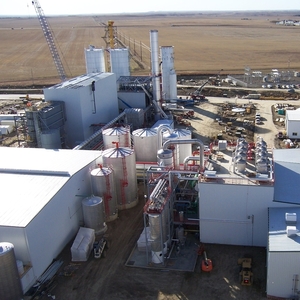EERC, Red Trail Energy continue to reduce CO2 emissions

Red Trail Energy
December 29, 2017
BY Erin Krueger
Red Trail Energy LLC and the University of North Dakota Energy & Environmental Research Center began investigating carbon capture, utilization, and storage (CCUS) technology as a way to reduce the carbon dioxide emissions associated with ethanol production last year with the support of the North Dakota Industrial Commission and the U.S. Department of Energy. The EERC has recently been awarded $345,000 of North Dakota Renewable Energy Program funding by the NDIC to continue this important research.
Reducing emissions enables energy producers to sell ethanol to states that have low-carbon fuel programs, such as California. CCUS technology captures and permanently stores carbon dioxide emissions.
Advertisement
Advertisement
“We are very excited to continue working with the EERC to investigate CCUS as an economical option for meeting low-carbon fuel program markets in other states,” said Gerald Bachmeier, RTE CEO.
The current phase of the project builds on previous EERC work, which looked at the potential for integrating CCUS with ethanol production. Using the RTE ethanol facility in Richardton, North Dakota, as a case study, EERC research successfully demonstrated both technical and economic feasibility of CCUS technology with ethanol production. This phase will further refine the technical requirements and related economic considerations for commercially successful CCUS implementation.
“North Dakota ethanol producers are well-situated for this opportunity because there is significant production capacity and excellent geology for carbon storage,” said project manager Kerryanne Leroux, EERC senior chemical engineer and oilfield operations team lead. “Continuation of the project will confirm regulatory requirements which inform decisions on the technical and financial needs of a commercially viable CCUS effort,” she stated.
Advertisement
Advertisement
North Dakota’s Renewable Energy Program is overseen by the NDIC, which consists of Gov. Doug Burgum, chairman, Attorney General Wayne Stenehjem and Agriculture Commissioner Doug Goehring. DOE also continues as a supporting project partner. Work will begin as soon as contracts are finalized and will run through the summer of 2018.
Related Stories
The U.S. Energy Information Administration maintained its forecast for 2025 and 2026 biodiesel, renewable diesel and sustainable aviation fuel (SAF) production in its latest Short-Term Energy Outlook, released July 8.
XCF Global Inc. on July 10 shared its strategic plan to invest close to $1 billion in developing a network of SAF production facilities, expanding its U.S. footprint, and advancing its international growth strategy.
U.S. fuel ethanol capacity fell slightly in April, while biodiesel and renewable diesel capacity held steady, according to data released by the U.S. EIA on June 30. Feedstock consumption was down when compared to the previous month.
XCF Global Inc. on July 8 provided a production update on its flagship New Rise Reno facility, underscoring that the plant has successfully produced SAF, renewable diesel, and renewable naphtha during its initial ramp-up.
The USDA’s Risk Management Agency is implementing multiple changes to the Camelina pilot insurance program for the 2026 and succeeding crop years. The changes will expand coverage options and provide greater flexibility for producers.
Upcoming Events










